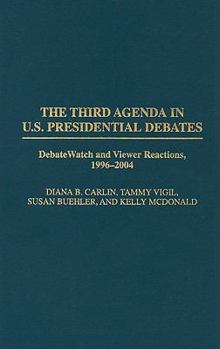The Third Agenda in U.S. Presidential Debates: DebateWatch and Viewer Reactions, 1996-2004
Drawing on scholarly research and media critiques, The Third Agenda in Presidential Debates examines the most recent U.S. presidential debates from the perspective of television viewers who watched the encounters first hand. Through a national program--DebateWatch--tens of thousands of viewers had an opportunity to provide feedback to the debate sponsors, the campaigns, and the media following the 1996, 2000, and 2004 presidential debates. As a result, thousands of groups met after each debate to discuss what they liked and didn't like about a particular candidate, what they learned, and what they still needed to know about the issues presented before them. These focus groups, along with various surveys and emails, allowed viewers to lay out a concise third agenda for the debates: the public's, one in which comparisons could be drawn between their own interests and that of the media and the candidates themselves.
Besides clearly mapping out the important aspects the public looks for when watching a debate, the authors demonstrate how citizen participation challenges candidates and their issues. In addition, the authors offer predictions for future debates and how new generations will choose to participate.




